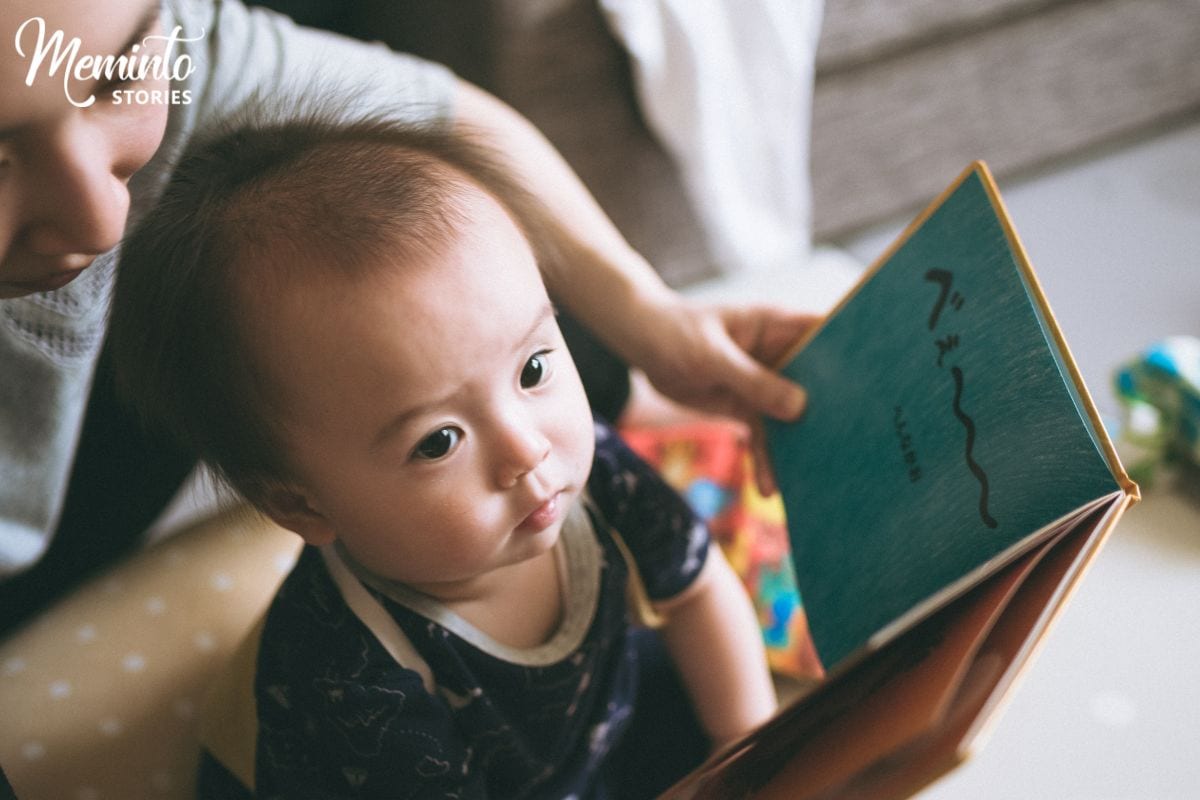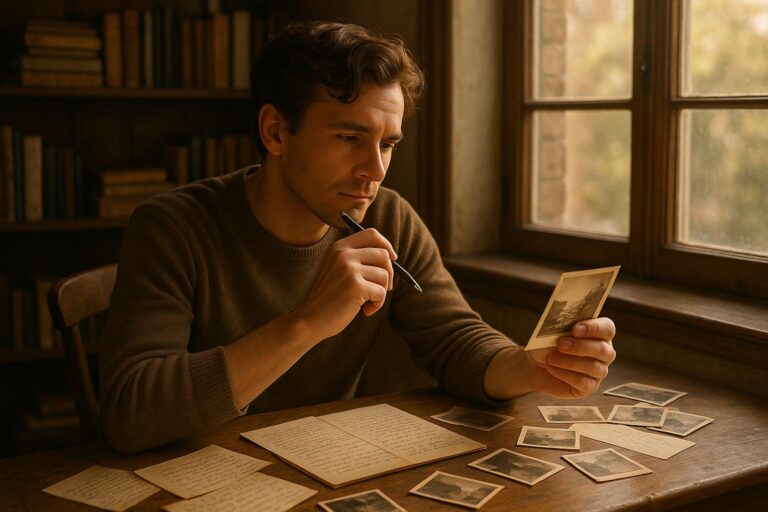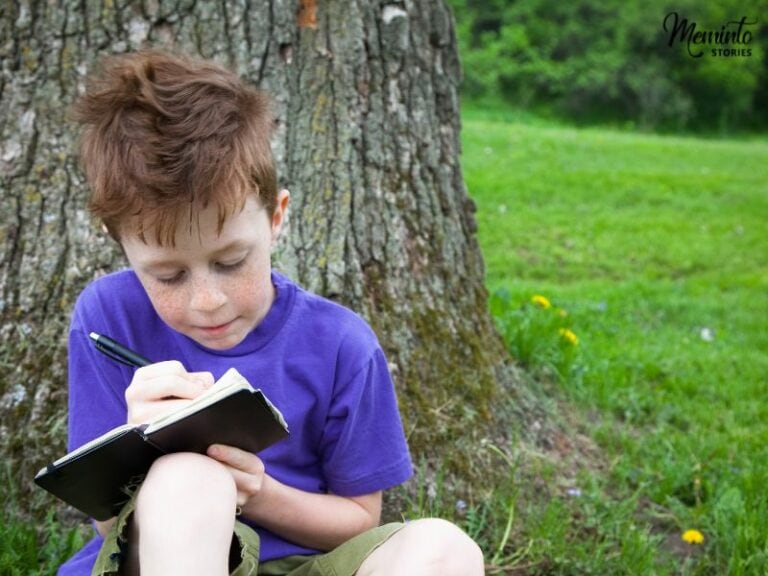There’s more to babyhood than first steps. What about the sleepless nights, silly sayings, and snack disasters? Those perfectly imperfect moments that make you laugh, cry, and question your sanity all at once. The way they mispronounced “banana” for six months straight, or how they had a complete meltdown because you gave them the blue cup instead of the red one.
Most parents start with good intentions and a beautiful baby book. But then life happens: 3 AM feedings blur together, first words get lost in survival mode, and suddenly your little one is starting kindergarten.
“I made it for my son so he knows how great our family time used to be,” says Ina from Germany, who created a childhood book. “He already loves it and enjoys looking at it over and over again.”
These first five years baby book ideas aren’t about Pinterest-perfect documentation. They’re about capturing the beautifully chaotic reality of raising a tiny human, as well as the moments between milestones that genuinely matter.
Why traditional baby books miss the real magic
Traditional baby books are beautiful keepsakes, but they’re designed for a different era. An era when parents had more time, fewer distractions, and maybe a village helping raise the child.
You’re lucky if you remember to brush your teeth, let alone document every milestone with perfect handwriting.
Here’s where traditional baby books fall short compared to what happens:
| Traditional Approach | What Happens |
| First word at 12 months | The gibberish phase that lasted 6 months |
| Perfect handprint crafts | Handprints on everything BUT the book |
| Monthly photo sessions | 847 blurry phone photos of the same smile |
| Weight/height measurements | The daily changes you notice |
The good stuff isn’t in the official milestones. It’s in the routine moments that disappear fastest, and here’s precisely why traditional books miss them:
- They focus on “firsts” instead of phases: Your baby’s first word gets recorded, but what about the two months they called every animal “doggie”? There was that hilarious phase where your 18-month-old insisted “banana” was pronounced “nana-nana-BOO” and would correct you every single time. Or when they discovered the word “no” and used it to answer everything, including “Do you want ice cream?”
- They assume you have time for crafts: While you’re supposed to be making handprint art, your toddler is fingerpainting the kitchen wall with yogurt. Last Tuesday, you finally sat down to do the monthly handprint page, and your two-year-old decided that moment was perfect for smearing purple paint in their hair. The real art is happening everywhere except in the book.
- They ignore the survival stories: Traditional books don’t have space for the night your baby slept through a thunderstorm but woke up every time you tried to close the dishwasher quietly. There’s no section for recording the week your toddler refused to wear pants, and you just gave up fighting it, letting them grocery shop in a shirt and diaper because picking battles is a real parenting skill.
- They skip the personality quirks: Where do you record that your child insists on organizing their crackers by size before eating them? Your three-year-old has convinced themselves that the vacuum cleaner is their pet named Mr. Vroomy and says goodnight to it every evening. These aren’t milestones, but they’re what make your kid uniquely theirs.
- They miss the parent moments: No traditional book asks about the day you cried because your baby finally said “mama” when they were hurt instead of “dada.” Or when you realized you’d been singing the wrong words to “Twinkle Twinkle” for eight months and your toddler gently corrected you.
10 baby memory book ideas for the first five years
Forget the standard “first steps, first words” approach. These ideas focus on capturing the real story of your child’s early years: the messy, funny, exhausting, and magical moments that happen between the official milestones.
Because in five years, you won’t just want to remember that your child walked at 11 months. You’ll want to remember how they celebrated by doing a victory lap around the coffee table, or how they refused to walk anywhere except backwards for two weeks straight.
1. The sleep wars
Every parent thinks they’ll document their baby’s sleep patterns. What they don’t expect is the epic saga that unfolds over the course of five years.
There’s the newborn phase, where your baby sleeps 20 hours a day but somehow never when you need them to, followed by the four-month sleep regression that nearly broke your marriage and the toddler who suddenly decided 5 AM was party time for discussing dinosaurs.
Take that desperate solution where you finally got your baby to sleep by running the hair dryer for three hours straight, or the night you discovered your toddler would only fall asleep if you sang “Old MacDonald” with exclusively dinosaur sounds. These ridiculous moments deserve their chapter because they’re the stories that make you laugh until you cry years later.
Here are the sleep war stories worth capturing:
- What was your most ridiculous sleep solution that worked?
- Describe the night you fell asleep standing up in the nursery
- What song/story/ritual became sacred bedtime requirements?
- Record the funniest thing your child said during a 3 AM wake-up
- How did your sleep schedule change each year?
These moments create the legendary stories you’ll tell at their wedding, like how they slept through fire alarms but woke up when you opened candy wrappers two rooms away. The way they’d pat your face at midnight and whisper “Mama sleeping?” before curling up like a tiny furnace against your back.
Recording these stories matters more than perfect sleep schedules ever will. “My neighbor first wrote a Meminto book. I was so fascinated by it that she helped me create my own,” says Gail from Canada, who documented almost 100 years of memories for her grandchildren.
2. First foods & epic meal failures
You start with such good intentions. Homemade purees, organic everything, perfectly balanced nutrition charts taped to the fridge.
Then your six-month-old takes one look at your lovingly prepared sweet potato mash and launches it across the kitchen like they’re auditioning for a food fight Olympics. Welcome to the real food journey.
The epic battles deserve documentation: that three-week period where your toddler would only eat foods shaped like circles, the morning you found them licking salt off pretzels and carefully placing the pretzel part back in the bag, and the day they declared ketchup was a vegetable and you were too tired to argue.
Watch how their relationship with food evolves in the most ridiculous ways for your baby milestone scrapbook:
| Month 6-12 | Year 1-2 | Year 2-3 | Year 3-4 | Year 4-5 |
| Everything on the floor | Only beige foods | Ketchup on everything | “I don’t like it” (hasn’t tried it) | Suddenly loves what they hated |
Here are the mealtime moments worth preserving:
- Which foods caused the most dramatic reactions (both love and hate)?
- Document the weird eating phases that lasted way too long
- What creative bribes worked to get vegetables eaten?
- Record the meals that ended in complete disaster
- How did snack preferences evolve from year to year?
“So much more than just a photo book,” says Verena from Austria about her childhood book. “Through the questions, beautiful old memories come up again. Even videos could be loaded into the book. Emotions like when it all happened!”
You can document the photos of the moments where they had spaghetti in their hair, and this will tell the whole story better than any food diary ever could. You can even have comedy gold voice recordings of their elaborate explanations for why green beans are “evil”, or videos of those grocery store meltdowns to capture the reality of feeding a tiny human with strong opinions.
Your teenager still won’t eat anything green, and with this book, you’ll remember exactly why. All these food stories explain everything about your family’s dinner table dynamics and why you always keep goldfish crackers as backup.
3. The language development tracker
Nobody tells you that your baby’s journey to talking will include an entire made-up language that only they understand.
There’s the babbling phase, where they engage in full conversations with the ceiling fan, complete with hand gestures and dramatic pauses. Then comes the pointing-and-grunting era, where you become a detective trying to decode whether “uh uh uh” means juice, crackers, or the neighbor’s cat outside.
Your toddler will confidently tell you stories about “the big woof woof who went swimming in the sky puddle,” and you’ll nod along like it makes perfect sense. They’ll call butterflies “flutterflys” for eight months and correct you when you say it wrong. There’s that magical moment when they string together their first real sentence, usually something like “Daddy’s shoes are stinky.”
Every family develops its secret vocabulary. Record the words only your family understands:
- What were their first attempts at family members’ names?
- Which words did they pronounce hilariously wrong for the longest time?
- What made-up words became permanent family vocabulary?
- Document their first jokes (even the ones that made no sense)
- How did they ask for their favorite things before they could say the words?
These linguistic adventures become the foundation of your family’s inside jokes. Videos of them “reading” their favorite book with completely made-up words capture their storytelling confidence. Photos of them having serious phone conversations with toy phones show their communication development. Even those blurry recordings of bedtime stories they tell their stuffed animals become treasured memories.
Your eight-year-old still calls bananas “nanas” and the library “libary” because those mispronunciations became too endearing to correct. When they’re teenagers rolling their eyes at family stories, these language memories explain precisely how your family’s unique vocabulary evolved. The word they invented for “I love you” at age two becomes the secret code you still use when they’re having a hard day.
“I highly recommend the childhood book. I made it for my son so he knows how great our family time used to be,” says Ina from Germany. “He already loves it and enjoys looking at it over and over again.”
4. Tantrum hall of fame
You think you’re prepared for toddler meltdowns until your two-year-old has a complete breakdown because you gave them the sandwich they asked for.
Your little one operates on a logic system only they understand, where crying over broken crackers is a legitimate emergency and the wrong cup can ruin an entire day. These aren’t just phases to survive, they’re personality insights disguised as chaos.
Your daughter once spent forty minutes sobbing because her cereal pieces were “looking at her wrong,” explaining between hiccups that Cheerios weren’t supposed to have holes and someone needed to fix them immediately. That same week brought a meltdown over the blue cup versus the red one, despite her never caring about cup colors before, followed by tears when you wouldn’t let her wear her tutu to the grocery store because it was “too Tuesday” for regular clothes.
Nothing surprises them about their logic. Your son dropped his toy car and immediately got furious at the floor for “stealing” it, demanding you tell gravity to stop being mean and give it back. The same kid who cried because the moon looked too small one night and insisted you call someone to make it bigger, then spent the next morning explaining why all dogs should wear shoes because “their feet get cold like mine do.”
What tantrum stories deserve their permanent record:
- The most ridiculous thing that triggered a complete meltdown
- Which comfort strategies worked (and which made it worse)
- Document the elaborate explanations they gave for their upset feelings
- Record the creative solutions they suggested to fix unfixable problems
- How did their tantrum triggers change as they grew?
Five years later, you’ll watch videos of them explaining why broken crackers are a serious problem and laugh until you cry. The photos from right after meltdowns tell the whole story: one minute they’re inconsolable, the next they’re perfectly fine asking what’s for snack.
Ina from Germany created a childhood book and says her son “already loves it and enjoys looking at it over and over again,” especially when they read about his toddler thinking together and laugh at how seriously he took everything.
These moments reveal your child’s unique perspective on the world. Someday, when they’re teenagers complaining about unfair curfews, you’ll remember when they thought broken crackers were the ultimate injustice, and you’ll understand that their passion for fairness started early.
5. Growth spurts & changing favorites
Nothing prepares you for how quickly toddler obsessions change. One week, they’re dinosaur experts who can name every species; the next week, they act like they’ve never seen a T. rex in their lives.
The fickleness is both hilarious and expensive. You’ll buy seventeen different dinosaur books, dinosaur pajamas, and dinosaur everything, only to discover they’ve moved on to trains, then trucks, then princesses, and then back to dinosaurs, but only the flying ones, because “the walking ones are boring now.”
Watch how their obsessions evolve as their little minds grow:
| Age 1-2 | Age 2-3 | Age 3-4 | Age 4-5 |
| One stuffed animal goes everywhere | Random objects become precious treasures | Everything needs elaborate backstories | Complex preferences with detailed rules |
| Comfort items rule their world | Rocks, sticks, and bottle caps matter | Toys have personalities and feelings | Only specific colors/shapes are acceptable |
Remember that stuffed elephant? Your eighteen-month-old dragged it everywhere, including bath time, where it turned into a soggy, smelly mess that you had to wash three times. Fast forward to age three, and that same beloved elephant got shoved under the bed, forgotten in favor of a random rock from the driveway. The rock wasn’t just any rock, though. It had a name, a complete backstory, and magical powers that helped with bedtime.
Food phases follow a similar unpredictable pattern. Your mac and cheese devotee suddenly decided it was “yucky” and would only eat sandwiches cut into triangles because rectangles were “wrong shapes.”
These passionate phases deserve their chapter because they show exactly how your child’s personality develops:
- What was their longest-lasting favorite thing?
- Which obsession surprised you the most?
- Record the elaborate backstories they created for random objects
- How did they explain why they stopped liking something?
- What made them switch from one favorite to another?
- Which abandoned favorites made surprise comebacks?
- Document the rules they created around their preferences.
“I made it for my son so he knows how great our family time used to be,” says Ina from Germany. Photos of bedroom walls covered in dinosaur posters, then princess decorations, then superhero everything, create a visual timeline of their growing imagination.
Years later, when they’re packing for college, you’ll both remember why that random rock mattered and laugh about the month they slept with a spatula because it “felt friendly.”
6. The silly & serious moments
Toddlers often struggle to understand the concept of appropriate timing when expressing their thoughts and engaging in behavior that may seem ridiculous.
The beautiful chaos of toddler logic means deep conversations about life happen right before they discover their belly button makes a funny noise when they poke it. These wild swings between wisdom and silliness become your favorite stories to tell.
Watch how they balance their growing minds:
| Their Serious Side | Their Silly Side |
| Asking why people have to die | Laughing at “pickle” for 20 minutes straight |
| Comforting sad stuffed animals with Band-Aids | Making up songs about their belly button |
| Worrying about feelings and fairness | Convinced their shadow is plotting against them |
| Declaring deep love with full intensity | Pretending to be furniture for entire afternoons |
| Asking where thoughts come from | Insisting socks have feelings too |
Their heartfelt moments hit you when you least expect them. Your son will hug your leg and declare with complete seriousness, “Daddy, you’re the best daddy in the whole world and also in space,” then immediately worry that his toy car looks lonely and needs a friend to sleep with.
“I highly recommend the childhood book,” says Ina from Germany. “I made it for my son so he knows how great our family time used to be. He already loves it and enjoys looking at it over and over again.”
These prompts will help you capture these personality snapshots that show who they’re becoming:
- What completely random thing made them laugh for weeks?
- Which deep question caught you totally off guard?
- Document the weird games they invented with their own rules
- Record the sweetest things they said during challenging moments
- What silly habit drove you crazy but was adorable?
- Which moments showed they understood someone else’s feelings?
Your phone is probably full of videos where they’re explaining why their teddy bear needs medicine or photos of them cracking up at something only they find hilarious. These moments show exactly when their personality starts shining through, and someday they’ll love seeing how their mind worked when everything was still magical.
7. Friendship & social moments
The way toddlers make friends is both hilarious and surprisingly wise. They’ll walk up to another kid at the playground and announce, “You’re my best friend now,” based solely on the fact that the other child has a cool dinosaur shirt.
Social skills develop in the most unexpected ways. Your shy two-year-old might hide behind your legs when meeting new people, but become the leader of an imaginary adventure with three other kids they just met. They’ll share their most precious snack with a stranger’s child while refusing to let their sibling touch their toys.
Playground politics get intense fast. One day, your child comes home devastated because their “best friend” played with someone else during recess. The next day, they had forgotten entirely the drama and made two new best friends who all shared a love for collecting rocks.
| Age 2-3 | Age 3-4 | Age 4-5 |
| Parallel play (side by side but separate) | Starting to play together | Complex games with rules and roles |
| “Mine!” is their favorite word | Learning to share (sometimes) | Understanding turn-taking and fairness |
| Friends are whoever is nearby | Preference for certain playmates | Real friendships start forming |
“So much more than just a photo book,” says Verena from Austria about her childhood book. “Through the questions, beautiful old memories come up again. Even videos could be loaded into the book. Emotions like when it all happened!”
Document these early social adventures:
- Who was their first real friend, and how did they meet?
- What made them decide someone was their “best friend”?
- Record the funny things they said about sharing and fairness
- Which social situations made them shy versus confident?
- What games did they invent with other kids?
- How did they handle friendship conflicts and making up?
When your child is older and struggling with friend drama, you’ll pull out that photo of them holding hands with their playground buddy and remember when friendship was as simple as liking the same color. The videos of them arguing over who gets to be the dinosaur, then solving it by deciding there can be two dinosaurs, show exactly when they started figuring out how relationships work.
8. Holiday & special day reality
Pinterest makes holidays look perfect, but toddler holidays are wonderfully chaotic disasters that become your best family stories.
Christmas morning means your two-year-old is more interested in the wrapping paper than the expensive toy inside. They’ll play with the cardboard box for three hours while the carefully chosen gift sits forgotten. Easter egg hunts can turn into meltdowns because children can’t find eggs fast enough, or they find too many and don’t want to share with their siblings.
Birthday parties deserve their category of beautiful chaos. Your child might cry during “Happy Birthday” because everyone is looking at them, hide under the table during present opening, or have a complete breakdown because the birthday cake isn’t the right shade of blue they imagined.
Holiday Expectations vs Reality:
1. What You Plan: Perfect family photo in matching outfits
What Actually Happens: Someone’s crying, someone’s missing a shoe, and the dog photobombed every shot
2. What You Plan: Elegant Easter brunch
What Actually Happens: Chocolate fingerprints on everything and a complete meltdown over which egg is “the prettiest”
3. What You Plan: Magical Christmas morning
What Actually Happens: More excitement over bubble wrap than the $50 toy
Their holiday logic makes perfect sense to them, but none to adults. They’ll insist on wearing their Halloween costume to Thanksgiving dinner or demand to know why Santa doesn’t bring presents to their stuffed animals, too.
These special moments need careful documentation:
- Which holiday traditions did they create that stuck around?
- What completely unexpected thing ruined (or made) their special day?
- Document their hilarious misunderstandings about holiday meanings
- Record their unique gift-giving logic and homemade presents
- How did they react to being the center of attention?
- Which holiday foods became their absolute favorites or worst enemies?
“With Meminto Stories I found a way to keep all my flashbacks of the first adventure with our child in a book,” says Selma from the UK. “Now we can cherish them forever.”
These imperfect holiday moments become the traditions you’ll recreate with grandchildren someday.
9. The daily routine reality
Nobody warns you that getting a toddler dressed can become a 45-minute negotiation involving three outfit changes and tears over socks that “feel bumpy.”
Your child will develop elaborate rules around the simplest tasks. They must eat their cereal in a specific order, counting each piece before it goes in their mouth. Getting dressed requires putting on the left sock first, then the right sock, and taking off the left sock because it doesn’t “match” their mood today.
Morning routines become exercises in creative problem-solving. You’ll discover your two-year-old has emptied an entire tube of toothpaste into the sink because they wanted to “paint with the minty stuff.” They’ll insist on brushing their teeth exactly 47 times or announce that today is backwards day and everything must be done in reverse order.
“I have captured the stories of our family over the last 12 months,” says Anita from Germany about her family book. “It’s more than just a photo book: you feel gratitude for all the great moments!”
The beauty lies in their developing independence, mixed with completely illogical thinking. They’ll refuse help tying their shoes but spend 20 minutes doing it wrong, getting increasingly frustrated but determined to figure it out themselves. Bath time becomes a complex negotiation about which toys are allowed in the water and why soap makes their hands “too slippery to work properly.”
These routine moments reveal so much about their growing personality:
- What daily task became their biggest power struggle?
- Which weird habits or rituals did they create around routine activities?
- Record their creative excuses for avoiding things they didn’t want to do
- What completely random thing made everyday tasks take forever?
- How did they try to help with grown-up tasks in their special way?
- Which routine finally clicked and made them feel proud?
Bedtime stories aren’t just about the books you read together. They’re about the 30-minute discussions that follow about whether monsters prefer pizza or sandwiches, and why the bedroom ceiling looks different in the dark. These daily struggles and victories become the foundation of their confidence and your patience as a parent.
10. Parent survival stories
Let’s be honest about something nobody talks about: parenting the first five years nearly breaks you in the most beautiful way possible.
There are days when you’ll find yourself hiding in the pantry, eating stale crackers just to have 30 seconds of peace. Days when you realize you’ve been wearing the same shirt for three days because changing clothes requires more energy than you possess. The morning you discovered your toddler had “decorated” the living room wall with peanut butter while you were in the bathroom for precisely two minutes.
You’ll develop survival skills you never knew you needed, like the ability to change a diaper with one hand while stirring pasta with the other, or how to have meaningful phone conversations using only facial expressions and hand gestures because someone is always napping or melting down nearby.
The exhaustion is real, but so are the unexpected victories. The day your child finally stayed in their bed all night, and you woke up panicking because something must be wrong. The moment they comforted you when you were having a rough day, patting your arm and saying, “It’s okay, Mama. Sometimes grown-ups need hugs too.”
These baby journal ideas capture the parenting reality checks that need their own chapter:
- What was your most creative solution to an impossible situation?
- Which parenting moment made you question everything you thought you knew?
- Document the times your child surprised you by being more mature than expected.
- Record your biggest parenting fails that somehow turned out okay
- What survival trick did you discover that worked?
- Which moment made you realize you were stronger than you thought?
“I felt well taken care of by Meminto. They made me feel like my project was just as important to them as it was to me,” says Anja from Germany. “I am proud to finally hold my book in my hand. It brings me joy and satisfaction.”
Your kids won’t remember that you served cereal for dinner three nights in a row during that particularly rough week. But they will remember how you turned it into a “breakfast for dinner party” and made it feel special. These survival stories become proof that perfect parenting doesn’t exist, but love always finds a way to make everything work out.
The five-year problem: What happens when you don’t start early
Your brain starts forgetting the details of the things you’ve experienced within 24 hours.
Research by German psychologist Hermann Ebbinghaus introduced the “forgetting curve,” which shows that we can lose about 50% of new information within an hour and up to 70% within 24 hours if we don’t review or reinforce it. For parents already running on empty thanks to sleep deprivation, work stress, and nonstop kid wrangling, those numbers can feel even more daunting.
Think about last Tuesday. Can you remember what your toddler wore, what they said that made you laugh, or how they reacted to lunch? Probably not, because your brain was busy managing seventeen other things while trying to keep a small person alive and happy.
The five-year window is brutal because it happens so gradually. Month by month, those precious details slip away. You’ll remember the big moments but lose the small ones that defined your child’s personality. The way they said “yellow” for the first six months, or how they insisted on wearing their superhero cape to the grocery store every single week.
Parents who wait until kindergarten to start documenting often say the same thing: “I wish I’d started sooner.” They’ll flip through their phone photos and find thousands of pictures, but struggle to remember the stories behind them. Why was their child covered in flour in that kitchen photo? What was so funny about that random Tuesday afternoon that made everyone laugh until they cried?
The details that disappear first are often the ones that mattered most:
- Daily conversations and made-up words
- Specific reactions to new experiences
- The evolution of their fears and comforts
- Exact phrases they used to express big feelings
- Small habits that lasted only a few weeks
“When my grandpa died, my whole family, 17 people in total, created this book,” says Albert from Germany. “We simply answered questions about his life. I was able to read so many new stories about him that I didn’t know yet!” The same principle applies to your child’s early years because waiting means losing stories you’ll never recover.
Your five-year-old won’t remember being two, but you’re already starting to forget what a two-year-old they were. The window for capturing their authentic early personality is closing faster than you think.
How to actually keep up with a baby memory book (real talk)
You know what doesn’t work? Promising yourself you’ll write in a beautiful journal every night after your baby goes to sleep.
Most baby journal ideas and memory advice come from people who have unlimited time and energy. They suggest elaborate scrapbooking sessions and weekly photo organizing marathons, while you’re over here celebrating the fact that everyone’s wearing clean clothes today.
Here’s what works when you’re running on three hours of sleep and your toddler just painted the kitchen with yogurt.
- Use your phone obsession
Your phone is already in your hand, so use it to your advantage. When your toddler says something that makes you laugh out loud, hit record immediately for a voice memo or text yourself in that moment. Don’t trust your sleep-deprived brain to remember it later because you won’t.
You’ll think you will, but then three weeks pass, and you’re staring at a photo of them crying and have no idea why they were upset or what happened five minutes later that made them happy again. Voice memos capture their actual voice and the way they pronounced things, which disappear faster than you’d expect.
- Text yourself everything
Treat your phone like a digital notebook that you’ll use. When something funny happens, text yourself right then.
Your future self will thank you when you’re scrolling through old messages and find gems you completely forgot about. Those random 2 AM texts when they finally said their first clear word, or the afternoon they had a whole conversation with the dog about sharing toys.
- Five minutes weekly wins
Set a timer for precisely five minutes once a week and dump everything into whatever system you’re using. Don’t sort, don’t organize, just get it down before it disappears forever.
“I wrote my Meminto Stories book mainly as a keepsake for my grandchildren and great-grandchildren,” says Willi from Germany. “Not only was it a breeze to do, but it was a lot of fun.” The mess doesn’t matter as much as having something to work with later.
- Print the chaos photos
You see those blurry shots where they’re mid-tantrum, covered in food, or wearing three different socks tell the real story of your family life, stop deleting them and start printing them instead.
The perfectly posed photos are lovely, but the chaotic ones capture their actual personality and your real daily life together. Years from now, you’ll want to remember what breakfast looked like, not just the clean version.
- Keep it simple for everyone
If your partner claims they’re not good at this stuff, give them one incredibly easy job they can’t mess up. Ask them to take one photo each week during bath time, or text you when the kid does something that makes them laugh. Sometimes the person who isn’t handling the daily chaos notices details you’re too tired to catch.
Ready to capture these fleeting five years?
Your five-year-old will be packing for college before you know it, and these early years will feel like a beautiful blur. The silly songs they make up, the way they mispronounce their favorite words, the elaborate stories they tell about their stuffed animals—these moments are disappearing every single day.
Starting a toddler memory book doesn’t have to be another overwhelming project on your endless to-do list. The key is finding a simple system that works with your chaotic daily life, capturing the real moments as they happen instead of waiting for the perfect time that never comes.
Don’t let these precious memories slip away forever. Start your Meminto Childhood Book today and preserve your little one’s personality, voice, and daily adventures in a beautiful keepsake that your family will treasure for generations to come.

















